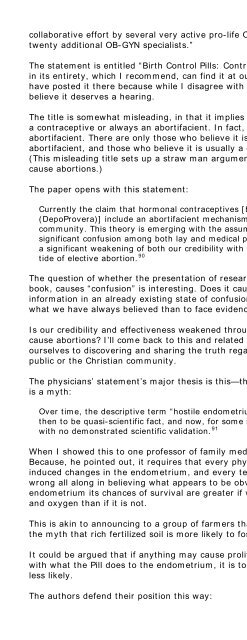Does the Birth Control Pill Cause Abortions
Does the Birth Control Pill Cause Abortions
Does the Birth Control Pill Cause Abortions
You also want an ePaper? Increase the reach of your titles
YUMPU automatically turns print PDFs into web optimized ePapers that Google loves.
collaborative effort by several very active pro-life OB-GYN specialists, and screened through about<br />
twenty additional OB-GYN specialists.”<br />
The statement is entitled “<strong>Birth</strong> <strong>Control</strong> <strong>Pill</strong>s: Contraceptive or Abortifacient” Those wishing to read it<br />
in its entirety, which I recommend, can find it at our EPM web page, at www.epm.org/doctors.html. I<br />
have posted it <strong>the</strong>re because while I disagree with its major premise and various statements in it, I<br />
believe it deserves a hearing.<br />
The title is somewhat misleading, in that it implies <strong>the</strong>re are only two ways to look at <strong>the</strong> <strong>Pill</strong>: always<br />
a contraceptive or always an abortifacient. In fact, I know of no one who believes it is always an<br />
abortifacient. There are only those who believe it is always a contraceptive and never an<br />
abortifacient, and those who believe it is usually a contraceptive and sometimes an abortifacient.<br />
(This misleading title sets up a straw man argument, since it is easy to prove <strong>the</strong> <strong>Pill</strong> does not always<br />
cause abortions.)<br />
The paper opens with this statement:<br />
Currently <strong>the</strong> claim that hormonal contraceptives [birth control pills, implants (Norplant), injectables<br />
(DepoProvera)] include an abortifacient mechanism of action is being widely disseminated in <strong>the</strong> pro-life<br />
community. This <strong>the</strong>ory is emerging with <strong>the</strong> assumed status of “scientific fact,” and is causing<br />
significant confusion among both lay and medical pro-life people. With this confusion in <strong>the</strong> ranks comes<br />
a significant weakening of both our credibility with <strong>the</strong> general public and our effectiveness against <strong>the</strong><br />
tide of elective abortion. 90<br />
The question of whe<strong>the</strong>r <strong>the</strong> presentation of research and medical opinions, such as those in this<br />
book, causes “confusion” is interesting. <strong>Does</strong> it cause confusion, or does it bring to light pertinent<br />
information in an already existing state of confusion Would we be better off to uncritically embrace<br />
what we have always believed than to face evidence that may challenge it<br />
Is our credibility and effectiveness weakened through presenting evidence that indicates <strong>the</strong> <strong>Pill</strong> can<br />
cause abortions I’ll come back to this and related objections later, but I think we need to commit<br />
ourselves to discovering and sharing <strong>the</strong> truth regardless of whe<strong>the</strong>r it is well-received by <strong>the</strong> general<br />
public or <strong>the</strong> Christian community.<br />
The physicians’ statement’s major <strong>the</strong>sis is this—<strong>the</strong> idea that <strong>the</strong> <strong>Pill</strong> causes a hostile endometrium<br />
is a myth:<br />
Over time, <strong>the</strong> descriptive term “hostile endometrium” progressed to be an unchallenged assumption,<br />
<strong>the</strong>n to be quasi-scientific fact, and now, for some in <strong>the</strong> pro-life community, to be a proof text. And all<br />
with no demonstrated scientific validation. 91<br />
When I showed this to one professor of family medicine he replied, “This is an amazing claim.” Why<br />
Because, he pointed out, it requires that every physician who has directly observed <strong>the</strong> dramatic pillinduced<br />
changes in <strong>the</strong> endometrium, and every textbook that refers to <strong>the</strong>se changes, has been<br />
wrong all along in believing what appears to be obvious: that when <strong>the</strong> zygote attaches itself to <strong>the</strong><br />
endometrium its chances of survival are greater if what it attaches to is thick and rich in nutrients<br />
and oxygen than if it is not.<br />
This is akin to announcing to a group of farmers that all <strong>the</strong>se years <strong>the</strong>y have been wrong to believe<br />
<strong>the</strong> myth that rich fertilized soil is more likely to foster and maintain plant life than thin eroded soil.<br />
It could be argued that if anything may cause prolifers to lose credibility, at least with those familiar<br />
with what <strong>the</strong> <strong>Pill</strong> does to <strong>the</strong> endometrium, it is to claim <strong>the</strong> <strong>Pill</strong> does nothing to make implantation<br />
less likely.<br />
The authors defend <strong>the</strong>ir position this way:



